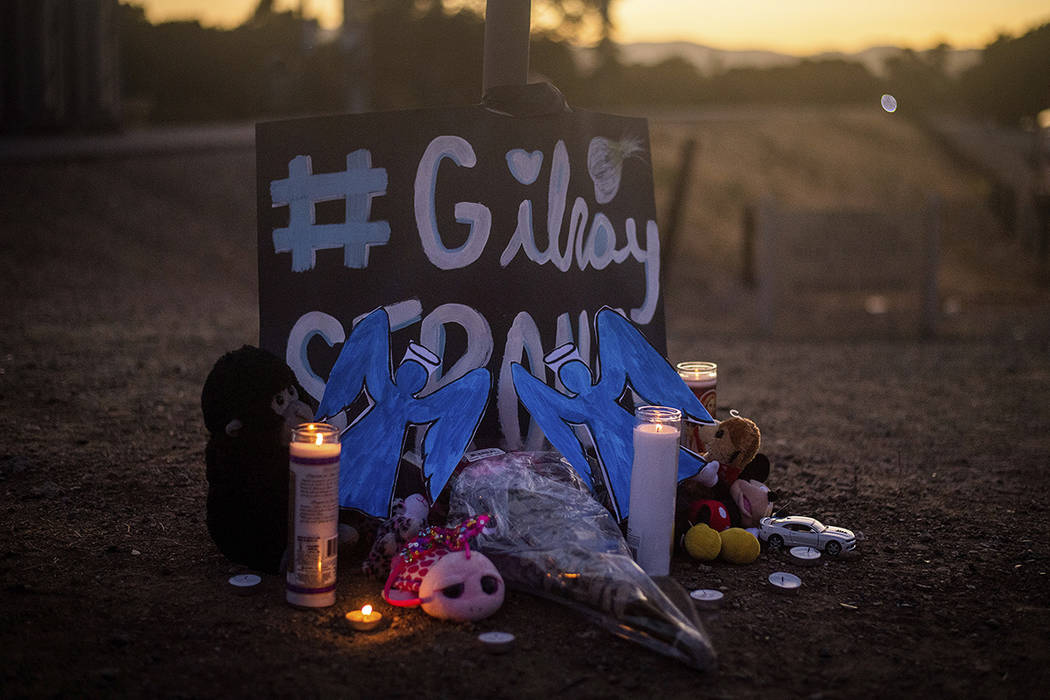Gilroy shooter thwarted California gun control
CARSON CITY — Sunday’s deadly shooting at an outdoor festival in Gilroy, California, with a type of semiautomatic rifle banned by that state but legal — and legally purchased — in Nevada, shows how a determined gun buyer can navigate patchwork state gun laws to obtain a locally prohibited weapon by crossing state lines.
Cross-border gun purchases, between Nevada and California and elsewhere, are tracked by federal firearms watchdogs and lamented by gun safety advocates — but also cited by gun rights groups to oppose state-specific gun legislation as all but futile.
The attack in Gilroy, where three people were killed before the shooter, 19-year-old Santino William Legan, was killed by police, happened in a state with some of the strictest gun laws in the country. Legan could not have purchased the weapon he used in California, which bans all rifles it classifies as assault-type weapons. Nor could he legally bring the weapon into California without a special permit, or legally possess any weapon at all as a 19-year-old in the Golden State.
But in Nevada, the WASR 10 semiautomatic rifle he bought, a knock-off of the military-grade AK-47, is legal for state residents to buy and own. It lists for $700 with the Fallon gun dealer where Legan purchased the weapon on the internet on July 9.
Authorities have yet to determine a motive in the shooting.
New laws wouldn’t have prevented shooting
Legan obtained the weapon in Nevada on the heels of the stricter gun laws state lawmakers enacted this year. Those changes, however, dealt with issues including background checks for private gun sales, a ban on bump stocks, and provisions to confiscate guns from potentially dangerous people. None of those laws would have affected the sale.
Gilroy police, who said the Nevada sale was legal, confirmed Wednesday that Legan used a Nevada driver’s license as proof of residency when he picked up the weapon. The sale also would have required a background check by the dealer, who is federally licensed.
The Nevada DMV, however, told the Review-Journal Wednesday it had no record of a license or state ID issued to him.
Authorities did not respond Wednesday to questions about the discrepancy.
A search Monday at an apartment in Walker Lake, a tiny hamlet in Mineral County about an hour south of Fallon, showed Legan spent some period of time there in the spring, perhaps to obtain residency that would allow him to buy a gun in Nevada. Officials have disclosed a list of items collected from the apartment but no additional information on what led them to it.
Tracing weapons by state
The federal Bureau of Alcohol, Tobacco, Firearms and Explosives tracks the origin of weapons recovered in each state. In 2017, the most recent year for data, 41,527 weapons were recovered and traced in California. More than 17,000 originated inside California. Arizona was the next highest source, with 2,185 weapons traced there; Nevada followed with 1,554.
The same data for Nevada show the same three bordering states involved. Among 5,046 weapons recovered and traced, nearly 2,700 came from inside Nevada, 319 from California and 174 from Arizona.
Weapons that are traced by the ATF are not necessarily used in crimes, according to the bureau’s individual state reports on gun tracking. “Firearm traces are designed to assist law enforcement authorities in conducting investigations by tracking the sale and possession of specific firearms,” according to the report. “Law enforcement authorities may request firearms traces for any reason, and those reasons are not necessarily reported to the federal government. Not all firearms used in crime are traced and not all firearms traced are used in crime.”
While California ranks among the states with the strictest gun laws — alongside states such as Hawaii, Massachusetts, New York and New Jersey — Nevada runs in the middle of the pack in state rankings by both gun-rights and gun-safety groups. That ranking will almost certainly change following this year’s legislative action in Carson City. Arizona, where changing demographics are also affecting attitudes on gun safety, ranks among states with the most lenient gun laws.
In terms of state-by-state per capita firearm mortality, CDC data for 2017 show California as seventh-lowest, grouped again with states with tougher gun laws such as Hawaii, New York, New Jersey and Massachusetts. Arizona and Nevada ranked in the higher mortality range, 33rd and 37th lowest, respectively.
Gun safety groups such as Everytown for Gun Safety, which maintains an online tool to compare laws between states, and the Giffords Law Center say the only solution to cross-border evasion is federal action by Congress. Gun control legislation passed the Democrat-controlled House in February but won’t come up for a vote in the Republican-controlled Senate. Failing federal action, gun-safety groups and gun-rights groups have focused efforts at the state level.
Without federal action, “States are left to find the political will to do these policies on their own and still suffer from the same types of loopholes that we saw happen in Gilroy,’’ said Allison Anderman, senior counsel at the Giffords Law Center. “Until we have comprehensive federal laws that apply to all Americans in all 50 states, there will always be these opportunities to slip through the cracks.”
Don Turner, president of the Nevada Firearms Coalition, noted little information has yet been made public about the man identified as the shooter. He said given the volume of people who own firearms, incidents such as the Gilroy shooting, involving a cross-border weapons purchase, are “relatively rare.”
“Just adding more laws I don’t think is a solution,” he added. “If we want to stop this, we have to really look at the underlying cause, not the tool.”
Response from lawmakers
Nevada lawmakers did not respond or declined to directly address the state’s link to the Gilroy shooting and again deferred to California authorities on matters related to the investigation. Gov. Steve Sisolak, who took office in January, said in a statement that Nevada “has made tremendous progress by passing the most consequential gun violence prevention legislation in our state’s history,” noting the bump stock ban, safe gun storage and red flag laws enacted this year. The bill on background checks for private gun sales was one of the first he signed as governor.
Sisolak, who was chairman of the Clark County Commission when a gunman killed 58 people and injured hundreds more at the Route 91 Harvest festival on Oct. 1, 2017, held ceremonies this spring when he signed gun safety legislation into law.
“These common-sense reforms reflect my firm commitment to keeping guns out of the hands of those who wish to do us harm,” Sisolak said. “I will continue working with law enforcement, elected and community leaders, and subject matter experts to explore different ways we can keep Nevadans safe,” he said.
A spokeswoman for Attorney General Aaron Ford said Wednesday the state’s top law enforcement officer “believes Nevada has made commendable strides in the past year to strengthen its gun laws,” and noted Ford’s testimony in support of Senate Bill 143, which institutes background checks on gun sales between private parties in Nevada starting in January. Background checks are already required when people buy guns from federally licensed gun dealers.
Contact Bill Dentzer at bdentzer@reviewjournal.com or 775-461-0661. Follow @DentzerNews on Twitter.























